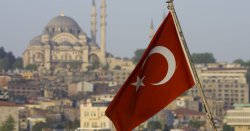

Several resort towns on the picturesque Spanish island of Majorca are experiencing a worrying decline in tourist arrivals, particularly concerning given that the summer holidays are now in full swing. The Mallorca Hotel Business Federation (FEHM) has noted that the popular tourist towns of Soller in the northwest and Capdepera in the east are experiencing the most notable decline.
"While we don't have official statistics yet, information from our various associations indicates that Capdepera, which heavily relies on German tourism, and Soller are experiencing the most significant drops in visitor numbers," said the federation's executive vice-president, María José Aguiló. The British tourist market appears to be posing a particular challenge, showing concerning signs of sluggish growth, while visitors from Nordic countries have become increasingly responsive to what the federation has called "negative messaging" about tourism activities in the region.
With the peak summer season now in full swing across Europe, this unusually and concerning mid-season lull is seeing hotels and restaurant terraces half-empty, parking spaces readily available and a sharp drop in customer numbers. This is triggering growing fears across Soller's hospitality sector, with bars, cafes and restaurants in key areas like the town centre feeling the impact.
One of the biggest indicators of the slump is that some businesses have decided to grant holidays to waiting staff - a highly unusual move in July, which is typically one of the busiest and most demanding months of the year. Others have halted planned hires altogether, the Majorca Daily Bulletin reported.
The federation's data suggests that occupancy forecasts haven't met expectations since May, with this trend continuing through June in several locations. "We're seeing two distinct booking patterns emerge: advance reservations and last-minute bookings, making precise forecasting particularly challenging," explained Mr Aguiló.
The state of tourism in Majorca is thought to be partly a result of the wave of anti-tourism protests and escalating local resentment, which has made many visitors feel unwelcome. Demonstrations in popular areas like Palma and Magaluf have drawn international attention, with protesters demanding a reduction in mass tourism due to overcrowding, rising rents and strain on local infrastructure. Signs reading “Tourists go home” and chants calling for “fewer tourists, more quality of life” have left some holidaymakers feeling targeted and uncomfortable.
A recent protest saw around 8,000 people march through the streets of Palma to voice frustration over overcrowding, housing shortages and environmental degradation. The demonstration was organised by the platform Menys Turisme Més Vida (“Less Tourism, More Life”) and included support from about 60 groups. Participants rallied under slogans like “Our territory is not for sale” and “Stop touristification”, calling for limits on tourist rentals, halting new hotel developments, and prioritising access to affordable housing for residents.
However, despite the challenges posed in Soller and Capdepera, the FEHM maintains an optimistic outlook. It projects that the overall season will mirror 2024's performance, albeit with varying results across different locations and markets. The federation emphasises that a more detailed assessment will be possible once complete data becomes available.

16 PerFlyer